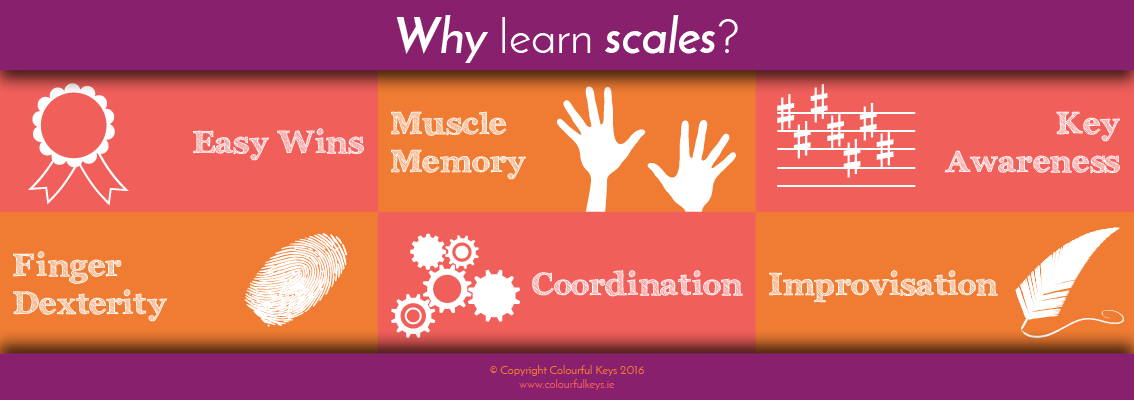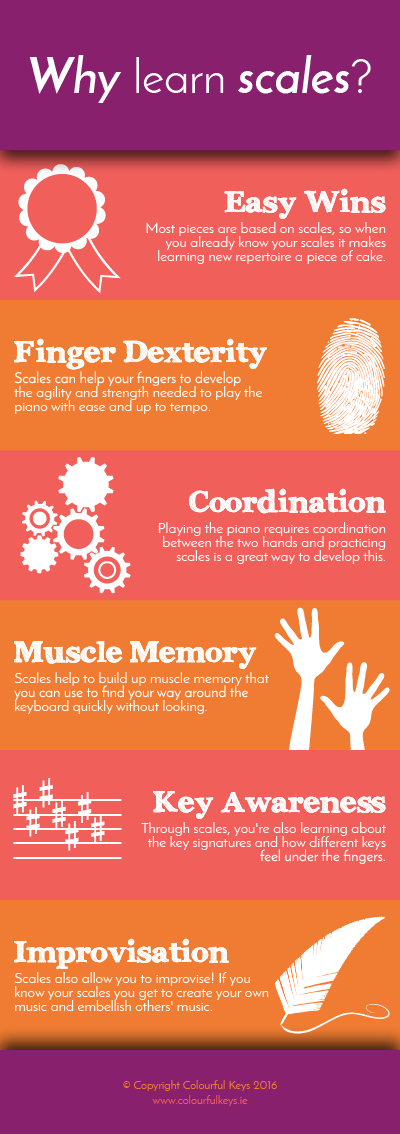If you teach your students to play scales you may have come up against this question. Perhaps every so often, perhaps even every week. Or every day!
“Why do I have to practice scales? They’re so boring!”
There are two ways to tackle questions like this in my opinion. Either you try to make scales more interesting (check out my guest post on Tim Topham’s site a while back for ideas on this), or you give reasons and motivations to practice them. I usually do both, this post will deal with the latter option.
Most of us teachers understand the benefits of scales…but it can be difficult to articulate it when you’re put on the spot. So, here’s six reasons you can give the next student who asks “Why learn scales?”.
You can even download a pretty pdf version. Keep it by the piano and pull it out whenever it’s needed!

Subscribe to the newsletter and get the Why Practice Scales infographic
Enter your details to subscribe to the newsletter for piano teachers with information, tips and offers.
I hate spam as much as you do! I will only send you emails related directly to piano teaching and you can unsubscribe at any time.
Vibrant Music Teaching members, you can access this resource inside the VMT library. Not a member yet? Find out more about becoming a member here.
1. Easy Wins
I always love opening up a new piece and getting to point out all the bits that are “gimmees”. Any chords, arpeggios and scales fit into this category.
Much of the standard classical repertoire has long scale runs. If you don’t know your scales these are just individual notes, but if you do they’re just one easy chunk of information.
2.Finger Dexterity
Another benefit is the development of strong and agile fingers. Students who diligently practice their scales usually develop a great ability to play quickly and accurately. These fast passages are often the most impressive parts of virtuosic pieces, a great selling point for many teenagers.
3. Coordination
One of the trickiest parts of the piano is how much coordination is required between the two hands. Developing this muscle team-work with something simple like scales means you can really listen out for notes that are not coming exactly together. When you don’t have to read music at the same time it frees up more brain space for active listening.
4. Muscle Memory
Scales can be played across several octaves and help to build a muscle memory of the keyboard. This muscle memory can be used not just to play scale passages, but to find your way around the keyboard without looking. The better the sense of this keyboard geography under your fingers, the easier it is to sight-read and play with fluency.
5. Key Awareness
Learning scales is the fastest way to become familiar with all 24 keys. The more familiar it you are with all the keys, the easier it is to read new music. Being able to feel your way around the sharps or flats in a certain key is the best way to read and play in different key signatures.
6. Improvisation
I’ve saved the most fun argument for last! When a student asks me why scales are relevant to them, I almost always get them to improvise. This one doesn’t need to be explained, it needs to be experienced.
- Comp a simple pattern in the bass while your student plays a scale they know.
- Get them to vary the note values, rhythms and patterns within the scale.
- Mid-flow ask them to select any other scale they know and switch to that key.
- Repeat for several different scales.
There’s two major benefits to this exercise. Firstly they get to experience what they can do with a scale they already know (even if it’s only C major pentascale).
Moreover, they get to see what you can do because you know your scales. Simple comping patterns can actually sound pretty cool, and you can change keys and styles because you have the building blocks already.


Subscribe to the newsletter and get the Why Practice Scales infographic
Enter your details to subscribe to the newsletter for piano teachers with information, tips and offers.
I hate spam as much as you do! I will only send you emails related directly to piano teaching and you can unsubscribe at any time.
Vibrant Music Teaching members, you can access this resource inside the VMT library. Not a member yet? Find out more about becoming a member here.
What’s your go to reason for practicing scales?
What do you say when a student asks you why?
Do you get this question a lot? Do you preempt it by giving the reasons up front?